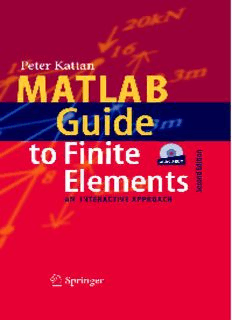
MATLAB Guide to Finite Elements: An Interactive Approach PDF
Preview MATLAB Guide to Finite Elements: An Interactive Approach
MATLAB Guide to Finite Elements Peter I. Kattan MATLAB Guide to Finite Elements An Interactive Approach SecondEdition With108Figuresand25Tables PeterI.Kattan,PhD P.O.BOX1392 Amman11118 Jordan pkattan@tedata.net.jo pkattan@lsu.edu LibraryofCongressControlNumber:2007920902 ISBN-13 978-3-540-70697-7SpringerBerlinHeidelbergNewYork Thisworkissubjecttocopyright.Allrightsarereserved,whetherthewholeorpartofthematerialis concerned,specificallytherightsoftranslation,reprinting,reuseofillustrations,recitation,broadcasting, reproductiononmicrofilmorinanyotherway,andstorageindatabanks.Duplicationofthispublicationor partsthereofispermittedonlyundertheprovisionsoftheGermanCopyrightLawofSeptember9,1965, initscurrentversion,andpermissionforusemustalwaysbeobtainedfromSpringer.Violationsareliable forprosecutionundertheGermanCopyrightLaw. SpringerisapartofSpringerScience+BusinessMedia springer.com (cid:2)c Springer-VerlagBerlinHeidelberg2008 Theuseofgeneraldescriptivenames,registerednames,trademarks,etc.inthispublicationdoesnotimply, evenintheabsenceofaspecificstatement,thatsuchnamesareexemptfromtherelevantprotectivelaws andregulationsandthereforefreeforgeneraluse. Typesetting:IntegraSoftwareServicesPvt.Ltd.,Pondicherry,India Coverdesign:ErichKirchner,Heidelberg Printedonacid-freepaper SPIN:11301950 42/3100/Integra 5 4 3 2 1 0 DedicatedtoMyProfessor,GeorgeZ.Voyiadjis Preface to the Second Edition Soon after the first edition of this book was published at the end of 2002, it was realized that a new edition of the book was needed. I received positive feedback from my readers who requested that I provide additional finite elements in other areaslikefluidflowandheattransfer.However,Ididnotwanttolengthenthebook considerably.Therefore,Idecidedtoaddtwonewchaptersthusaddingnewmaterial whilekeepingthesizeofthebookreasonable. The second edition of the book continues with the same successful format that characterizedthefirstedition–whichwassoldoutinlessthanfouryears.Icontinue toemphasizetheimportantfeaturesofinteractivityofusingMATLAB1coupledwith the simplicity and consistency of presentation of finite elements. One of the most importantfeaturesalsoisbypassingtheuseofnumericalintegrationinfavorofexact analytical integration with the use of the MATLAB Symbolic MathToolbox2.The useofthistoolboxisemphasizedinChaps.12,13,14,and16. Inthenewedition,twoimportantchangesareimmediatelynoted.First,Icorrected the handful of typing errors that appeared in the first edition. Second, I added two newchapters.Chap.16includesanothersolidthree-dimensionalelement(theeight- nodedbrickelement)ingreatdetail.Thefinalchapter(Chap.17)providesareview of the applications of finite elements in other areas like fluid flow, heat transfer, geotechnical engineering, electro-magnetics, structural dynamics, plasticity, etc. In this chapter, I show how the same consistent strategy that was followed in the first sixteenchapterscanbeusedtowriteMATLABfunctionsintheseareasbyproviding theMATLABcodeforaone-dimensionalfluidflowelement. OneminordrawbackofthefirsteditionasIseeitistheabsenceofaconcluding chapter. Therefore, I decided to remedy the situation by adding Chap. 17 as a real concludingchaptertothebook.Itisclearthatthischapterisdifferentfromthefirst sixteenchaptersandthusmaywellprovideawellwrittenconclusiontothebook. ThesecondeditionstillcomeswithanaccompanyingCD-ROMthatcontainsthe full set of M-files written specifically to be used with this book. These MATLAB functions have been tested with version 7 of MATLAB and should work with any 1MATLABisaregisteredtrademarkofTheMathWorks,Inc. 2TheMATLABSymbolicMathToolboxisaregisteredtrademarkofTheMathWorks,Inc. VIII PrefacetotheSecondEdition laterversions.Inaddition,theCD-ROMcontainsacompletesolutionsmanualthat includesdetailedsolutionstoalltheproblemsinthebook.Ifthereaderdoesnotwish toconsultthesesolutions,thenabrieflistofanswersisprovidedinprintedformat theendofthebook. Iwouldliketothankmyfamilymembersfortheirhelpandcontinuedsupportwith- outwhichthisbookwouldnothavebeenpossible.Iwouldalsoliketoacknowledge thehelpoftheeditioratSpringer-Verlag(Dr.ThomasDitzinger)forhisassistancein bringingthisbookoutinitspresentform.Finally,Iwouldliketothankmybrother, Nicola,forpreparingmostofthelinedrawingsinbotheditions.Inthisedition,Iam providingtwoemailaddressesformyreaderstocontactme(pkattan@tedata.net.jo and pkattan@lsu.edu).The old email address that appeared in the first edition was cancelledin2004. December2006 PeterI.Kattan Preface to the First Edition ThisisabookforpeoplewholovefiniteelementsandMATLAB3.Wewillusethe popularcomputerpackageMATLABasamatrixcalculatorfordoingfiniteelement analysis. Problems will be solved mainly using MATLAB to carry out the tedious andlengthymatrixcalculationsinadditiontosomemanualmanipulationsespecially whenapplyingtheboundaryconditions.Inparticularthestepsofthefiniteelement methodareemphasizedinthisbook.Thereaderwillnotfindready-madeMATLAB programsforuseasblackboxes.Insteadstep-by-stepsolutionsoffiniteelementprob- lemsareexaminedindetailusingMATLAB.Problemsfromlinearelasticstructural mechanicsareusedthroughoutthebook.Theemphasisisnotonmasscomputation orprogramming,butratheronlearningthefiniteelementmethodcomputationsand understanding of the underlying concepts. In addition to MATLAB, the MATLAB SymbolicMathToolbox4isusedinChaps.12,13,and14. Manytypesoffiniteelementsarestudiedinthisbookincludingthespringelement, the bar element, two-dimensional and three-dimensional truss elements, plane and spacebeamandframeelements,two-dimensionalelasticityelementsforplanestress and plane strain problems, and one three-dimensional solid element. Each chapter dealswithonlyonetypeofelement.Alsoeachchapterstartswithasummaryofthe basic equations for the element followed by a number of examples demonstrating the use of the element using the provided MATLAB functions. Special MATLAB functionsforfiniteelementsareprovidedasM-filesontheaccompanyingCD-ROMto beusedintheexamples.ThesefunctionshavebeentestedsuccessfullywithMATLAB versions5.0,5.3,and6.1.Theyshouldworkwithotherlaterversions.Eachchapter alsoendswithanumberofproblemstobeusedaspracticeforstudents. Thisbookiswrittenprimarilyforstudentsstudyingfiniteelementanalysisforthe firsttime.Itisintendedasasupplementarytexttobeusedwithamaintextbookfor anintroductorycourseonthefiniteelementmethod.Sincethecomputationsoffinite elements usually involve matrices and matrix manipulations, it is only natural that studentsuseamatrix-basedsoftwarepackagelikeMATLABtodothecalculations. 3MATLABisaregisteredtrademarkofTheMathWorks,Inc. 4TheMATLABSymbolicMathToolboxisaregisteredtrademarkofTheMathWorks,Inc.
Description: